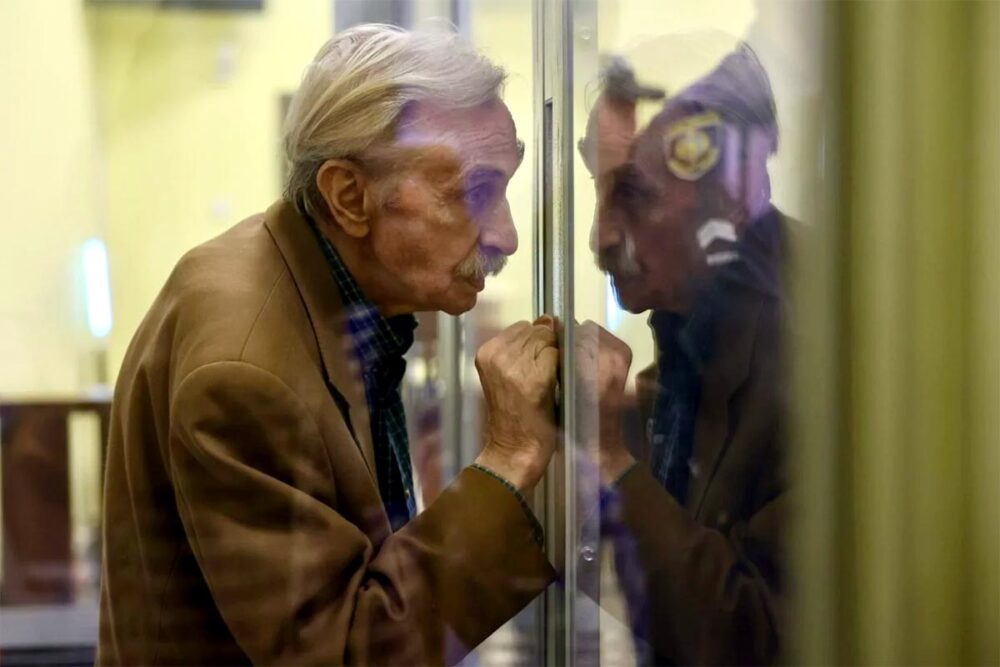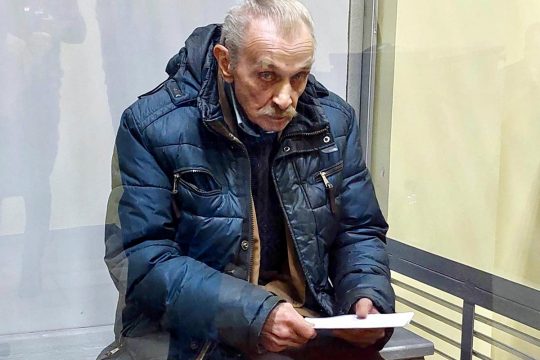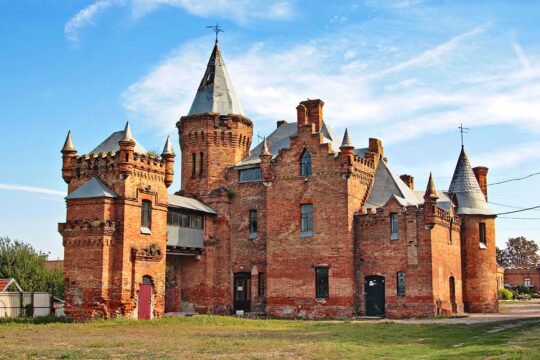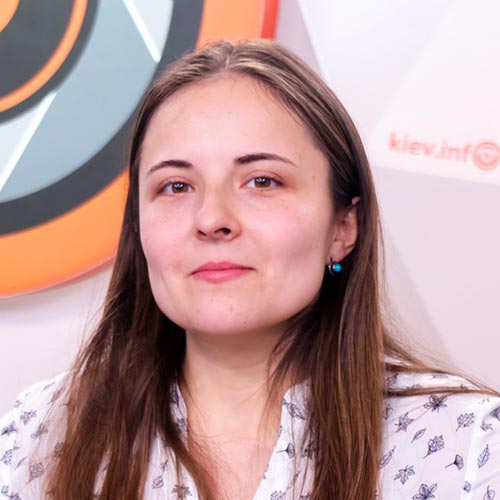According to the investigators, in the first days of Russia’s full-scale invasion, on March 4, 2022, Ukrainian citizen Oleksandr Kostornyi sent an image of the grounds of the International Center for Peacekeeping and Security, better known in Ukraine as the Yavoriv military training facility, to his friend Oleksandr Svystunov. At Svystunov’s request, Kostornyi forwarded the message to the email address of a certain Nikolay Vodolazov, who was identified as an FSB [Russian intelligence services] agent Yuri Vodolazkyi.
A former Lviv resident, Svystunov is now holding Russian citizenship and has been living in the annexed Crimea since 2014. He is one of the founders of the political party Russian Bloc and of an organisation called Russian Movement of Ukraine. Since 2017, the National Security and Defence Council of Ukraine imposed sanctions on Svystunov, including a ban on his entry to Ukraine.
On March 13, 2022, Russia fired missiles at the Yavoriv military base, located 30 kilometres from Lviv, near the border of Ukraine with Poland, striking the barracks where the soldiers were sleeping. 61 people were killed and 160 others were injured.
A Russia-controlled network of individuals
Aged 74, Kostornyi is a native of Lviv, a former KGB officer, head of the Russian Pushkin Society, and co-founder and chairman of several other organisations. He is married and has four daughters and six grandchildren.
According to the investigation, he belonged to a Russia-controlled network of individuals who, under the guise of public activity, were working on destabilising Ukraine. Among his contacts, it found employees of the Federal Agency for the Commonwealth of Independent States Rossotrudnichestvo, of the Russian Embassy in Kyiv, of the Russian Ministry of Foreign Affairs, former KGB officers, as well as journalists of Russian channels, etc.
Until 1990, Kostornyi served as a major in the Department of External Surveillance in the State Security Committee of the former USSR (KGB). He graduated from the KGB Higher Red Banner School in Moscow. From 2002 till 2010, Kostornyi ran for the Verkhovna Rada of Ukraine on behalf of pro-Russian parties – the Progressive Socialist Party of Ukraine, Natalia Vitrenko’s People’s Opposition Bloc and the Communist Party of Ukraine.
At the time, in his correspondence with pro-Russian activists, Kostornyi wrote, according to the investigation: “The Nazi successors are in power in Ukraine”, “the level of fascism in western Ukraine is outrageous” and talked about “rubbing the faces of the modern-day Ukrainians across the floor.” On May 9, 2015, he wore a St George’s ribbon while visiting the Hill of Glory in Lviv to lay flowers on the graves of Soviet soldiers. On the evening of the same day, Kostornyi appeared on Rossiya-1 TV channel, complaining that the “Nazis” had torn his St George’s ribbon.
Organizing protests in Western Ukraine
The investigation also established that back in 2015, Svystunov was giving Kostornyi tasks for organising protests in western Ukraine, where the following slogan was heard: “Poroshenko to resign! Dismiss the government!” and other similar messages. For each protester brought in, organisers were promised a payment of 50-100 hryvnias. To this, Kostornyi explained that Svystunov was suggesting protests to address human rights violations. He added that they were held with the permission of the authorities and that the organisations he represented were officially registered and not accomplishing anything against Ukraine.
The man considers himself a “committed human rights activist with 30 years of experience”. He is one of the founders of the International Society for Human Rights, whose badge he wore on his jacket lapel whenever he appeared in the courtroom. Defence lawyer Yuriy Paley also stated in court that his client lived a “normal public life” and, for instance, participated in the drafting of the law on national minorities.
The media soon referred to him as a “strike corrector”
The indictment against Kostornyi was submitted to the court at the end of September 2022. However, the case began to be heard on the merits only in January 2023. Long before the verdict, the media began to call the accused a “strike corrector”, and relatives of those killed and reported missing at the Yavoriv military base attended court hearings, expecting a punishment.
Kostornyi burdened the court with numerous motions. He complained about the bias of the press and accused the court of indifference. “Am I actually supposed to die in a cell?! Are you aware that I’m in a hospital ward right now, after one of the suicidal prisoners assaulted me with his fists?”
Unable to get what he wanted, Kostornyi yelled, interrupted Judge Viktor Romaniuk, argued in a raised voice and thus received warnings that he would be removed from the courtroom. He also demanded not to allow journalists to take photos and videos of the court hearing. “Those filming do not report accurately on the course of the court hearing, do not report the opinions I express [...] I did not commit that crime. I suggested investigating whether it was even possible to do what I was charged with. This was not mentioned anywhere. The information that I allegedly guided missile strikes is false.”
Defence lawyer Paley spoke of “leverage over the media” and promised that “civil lawsuits will be filed.”
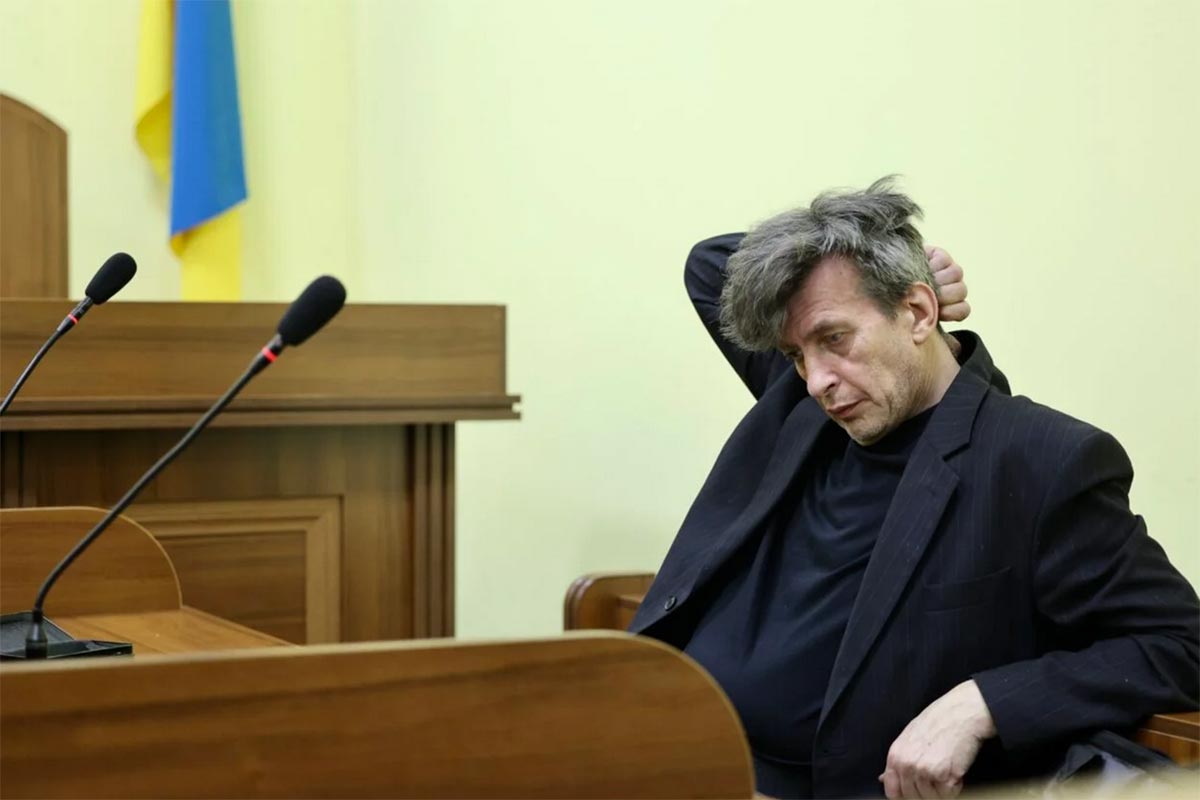
“It wasn’t a map I photographed”
The accused wanted the trial to be closed to the public, declaring that he would reveal “secret data” from the case regarding the location of military sites at the Yavoriv facility. But a couple of minutes later, he said that in fact, the prosecutor and investigators had already disclosed everything that was classified in open hearings – and that they were now correctors of Russian missiles, not him. “I have not visited the Yavoriv training facility since 2013, which can be proved by the examination of my phone’s movements,” Kostornyi stated.
And in fact, the mobile phone data showed that on July 19, 2021, Kostornyi visited the Starychi hunting and fishing grounds, located near the military base, where he took a picture of a map on the wall. It was this image that he handed over to his Russian interlocutor in early March 2022. Which he acknowledged. “I have been a member of hunting and fishing associations for many years. These associations allow people over 70 to use their services free of charge. I went to Starychi to renew my membership card,” he explained. “It is clear that to get to the lakes where you can fish free of charge, you need to know how to get there. It was for this purpose that I photographed the chart on the wall.”
– What was the purpose of sending it to them [Svystunov and Vodolazov]? prosecutor Andriy Nikerui asked.
– For no particular purpose. This is a common communication between people who use the services of the hunting and fishing sector.
– Have you sent such charts to everyone?
– Well, more than once.
The defence argued that there was no document that would certify that the map-chart of the Starychi hunting and fishing grounds was classified or prohibited from being distributed. The lawyer said he personally visited the premises of the estate and that the map was displayed on the wall in the corridor and was openly accessible.
“False! False! I didn’t write that!”
The main evidence was the correspondence and telephone contacts of the accused.
The prosecutor quoted a message identified as coming from the FSB agent Vodolazkyi: “Are there dorms nearby where military instructors live, hotels maybe? Is there any abnormal number of foreigners? Where can iron stuff and foreign mushrooms be? In general, is there more clear information about that area?” According to him, Kostornyi replied to this question by sending the Starychi map, once again, with a mark “3”.
“You say it was me who put a mark? Those are your fantasies,” Kostornyi reacted. “The marks that are there were not made by me. They were made when this chart was given for use to members of the hunting and fishing grounds. It is publicly available and was authorised by the Ministry of Justice of Ukraine back in 2008.”
– Later, there are questions: ‘Where can military instructors live? 3?’ And you answered: ‘4’.
– I did not answer.
– Later you were asked: ‘3 and 4 are dormitories and places to sleep?’
– And what did I answer? Read it! It says that I refused to answer.
– No, there is an answer from you: ‘These are all pictures from 2021. But it is quite possible that these buildings are used for these purposes.’
– Yes. It is possible. It’s an assumption, not a statement.
– You said that the correspondence was about mushrooms, not military dormitories.
– I was asked. I didn’t know for what purpose. I answered vaguely.
– Weren’t you troubled by the fact that hundreds of missiles were flying towards Ukraine at that time?
– Don’t lie! Nothing was flying at that time! The question is deceitful!, Kostornyi shouted.
– In March 2022, when Russia launched a full-scale invasion of Ukraine, you wrote in Russian about the facilities where military personnel could live.
– False! False! I didn’t write that! These are your thoughts on this matter. If everyone had the opportunity to see these records, there is always ‘not answering’, ‘not answering’, ‘not picking up the phone’...
– Explain it to us, if you didn’t write this, then who did? the judge intervened.
– Ask the prosecutor, Kostornyi replied.
– It’s your phone, not the prosecutor’s.
– Your Honour, I would like to draw your attention to the fact that the investigator in charge of the case refused to let me be present during the examination of the phone. In other words, I don’t know what was put in it and how.
– Do you have a theory as to who could have carried out this communication, if not you?, the judge asked.
– The prosecutor, in my absence. The investigator who had the phone.
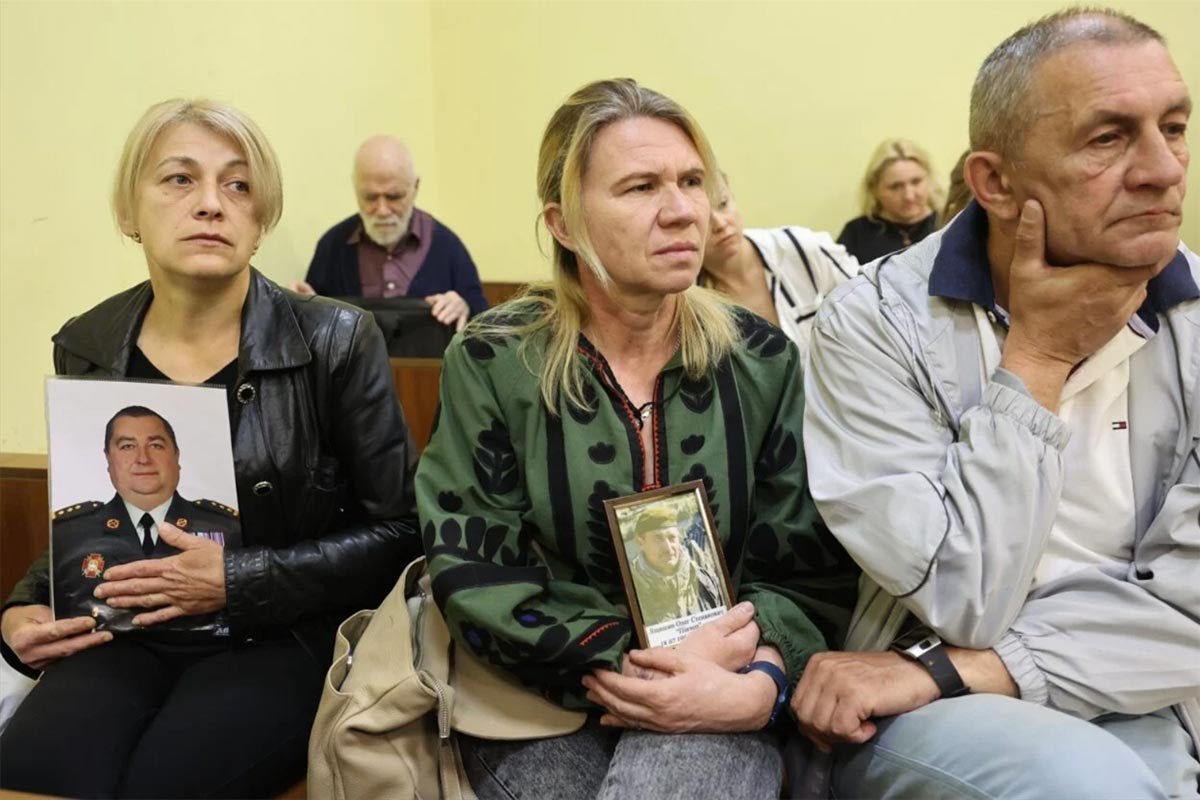
“Your version of events changes every five minutes, Kostornyi!”
Kostornyi believes that the prosecutor is trying to make a scapegoat out of him and protect the administration of the training facility. The air raid alert began at 3 a.m., he said, but the warning systems at the training facility did not function and the military remained asleep in the buildings. Therefore, people’s deaths are allegedly the administration’s responsibility.
“These missiles are not launched according to the charts I was using and sending. They were using American satellites for targeting. They need to have images from space,” the accused said. Meanwhile, the case files do not contain any expert conclusions on how such missiles are targeted. And Kostornyi often would contradict himself.
He confirmed that he was a board member of a veterans’ organisation in Lviv and that he was distributing humanitarian aid. “I would travel to districts around Lviv at my own expense, collect food and deliver it to elderly people who were 80 or older,” he said.
– Please specify for how long you were doing this? the judge asked.
– For many years. I was engaged in human rights activities for 30 years.
– When the prosecutor asked you a question, you said that you had not travelled outside Lviv since 2013. You only went to Starychi once... And now you say that you have been travelling to all the villages for 30 years and distributing humanitarian aid.
– That’s right.
– You said five minutes ago that you hadn’t travelled outside Lviv since 2013. Was it a lie?
– I meant the area of the training facility.
– Your version of events changes every five minutes, Kostornyi!
For the Defense, there is no case of high treason
The defence lawyer believes that in the case of high treason, Kostornyi’s interlocutor should have been a state authorities’ representative of the enemy country. “Svystunov may or may not be under sanctions. I will not even verify this. But he is a citizen of Ukraine, and it has not been proven that he is a representative of the enemy,” Paley said.
Kostornyi added that if he is guilty of correcting the missile attack, he should have been charged with causing death and material damage. But the indictment does not include this. “If I am guilty of causing the deaths, I can only express my condolences to the families of the victims. But the prosecutor doesn’t consider me guilty, because he writes: there are no victims in the criminal proceedings. [...] I really have nothing to do with that disaster. Then what am I being accused of? That I took a picture of the location of a hunting and fishing grounds, which is available to all citizens of Ukraine?” The accused wrapped up his closing statement in Russian: “Sooner or later, conscience awakens. I hope to live long enough to see the consequences of the conscience waking up in those present here. Thank you!”
Kostornyi was sentenced to the maximum sentence for treason, 15 years in prison. He could not have been sentenced to life imprisonment even if the charges were more severe, as the law does not allow it to be imposed on people who are over 65 years old.
This report is part of our coverage of war crimes justice produced in partnership with Ukrainian journalists. A first version of this article was published on the "Sudovyi Reporter" website.


